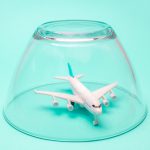There are currently more than 7.4 million active COVID‐19 cases worldwide. This makes business travel challenging, especially for those going abroad. Early and extensive preparation by both traveling employees and employers with traveling personnel is key.
Essentials for Traveling Employees
- Keep updated on the changing border openings and travel guidelines. Visit the website of your country’s embassy before booking the trip to your international destination. Depending where you are traveling from and your stop‐over and final destination, you may have to take a COVID‐ 19 test shortly before traveling abroad, test at the airport upon arrival, or self‐quarantine for 14 days upon arrival. Factor in testing time as you schedule any in‐person meetings at your destination accordingly.
- Follow the regular COVID‐19 safety guidelines: wash your hands thoroughly with soap, use hand sanitizer when hand washing is unavailable, wear a mask, keep a distance of six feet from others, and be aware of any surfaces you touch.
- Bring a safety kit of supplies, such as prescription medications, over‐the‐counter medications, a thermometer, and pre‐packaged food. This will help to ensure you have everything you need outside the room service hours, in case you need to self‐quarantine.
- Double down on the usual measures to ensure your physical safety: Make sure that your work colleagues know not only the name and address of your hotel but your room number. Register with your country’s embassy. Do not meet strangers unless the meeting has been coordinated beforehand. Familiarize yourself with your travel health insurance and know what your nearest hospitals are, including their capability to handle COVID‐19 testing and care and to provide any linguistic support you may require.
- Take the necessary precautions if you develop COVID‐19 symptoms. This includes informing the hotel staff as soon as possible if you develop COVID‐19 symptoms, so that those who will be taking care of your cleaning, laundry, and food needs throughout your stay are informed and take the necessary precautions. In addition, should you develop COVID‐19 symptoms, you will need to self‐ quarantine for around 14 days or longer. Be sure to keep good records of the date of infection, dates of last symptoms, and full dates of quarantine. You may need to prove self‐quarantine at a hotel if you answer a border guard’s questions about having COVID‐ 19 in the affirmative. You will need to show and likely prove you followed recommended quarantine procedures.
Whether your medical emergency is COVID‐19 related or not, be aware that your ability to get home on medical aircraft will be bound both by the public health guidelines and restrictions imposed on foreign aircraft operating in the country. Be sure you and your employer understand what is covered under your travel and medical evacuation insurance ahead of time. Check with your Human Resources team or insurance provider to know what is covered.
Essentials for Employers with Traveling Personnel
- Provide pre‐testing, personal protective equipment (PPE) like face masks, hand sanitizer, and intelligence briefings on the evolving pandemic.
- Vet the cleaning of standards of the transportation services taking employees to and from the airport or train station.
- Provide employees with instructions to everything from how to navigate the security system at the airport to what to do if they develop COVID‐19 symptoms, such as safely arriving to trusted testing sites and hospitals. Be sure to plan ahead on how you will transport an employee home should they develop COVID‐19 and require medical evacuation. Most travel insurance and medical evacuation coverage policies do not cover communicable or infectious diseases, so be sure to do your research ahead of time on who can assist. Global Guardian, for example, maintains an extensive network of vetted partner aircraft that are outfitted to transport persons with communicable and infectious diseases and can transport a patient diagnosed with COVID‐19 at a fee for service rate.
- Budget for the related housing, food, and medical costs should employees get sick.
- Invest in digital tools that allow employees to get real‐time alerts about the latest COVID‐19 announcements and border closures and that make it easy for employees to call for help in case of an emergency. With mobile apps like Global Guardian’s, travelers can quickly alert security professionals who can immediately dispatch local emergency response teams.
As the COVID‐19 pandemic continues and the flu season approaches, medical systems in the United States and around the world will once again come under extreme strain. Travel this fall and winter will be especially challenging, but planning will make it less stressful for you and your employees and can help improve safety for everyone.
To learn more about how Global Guardian can support your team with their travel security needs amid COVID‐19, visit www.globalguardian.com.




Leave a Reply